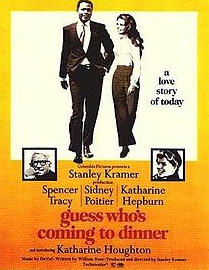

Guess Who's Coming to Dinner is a 1967 American comedy-drama film starring Spencer Tracy, Sidney Poitier and Katharine Hepburn, and featuring Hepburn's niece Katharine Houghton. The film contains a (then rare) positive representation of the controversial subject of interracial marriage, which historically had been illegal in most states of the United States, and was still illegal in 17 states—mostly Southern states—up until 12 June 1967, two days after Tracy died, when anti-miscegenation laws were struck down by the Supreme Court in Loving v. Virginia. The film was produced and directed by Stanley Kramer and written by William Rose. The movie's Oscar-nominated score was composed by Frank DeVol.
The film is notable for being the ninth and final on-screen pairing of Tracy and Hepburn (filming ended just 17 days before Tracy's death). Hepburn never saw the completed film; she said the memories of Tracy were too painful. The film was released in December 1967, six months after his death.
Plot
The film tells the story of Joanna "Joey" Drayton (Katharine Houghton), a young white woman who has had a whirlwind romance with Dr. John Prentice (Sidney Poitier), a young, idealistic black physician she met while in Hawaii.
The plot centers on Joanna’s return to her liberal upper-class American home in San Francisco, bringing her new fiancé to dinner to meet her parents, newspaper publisher Matt Drayton (Spencer Tracy) and his wife, small art gallery owner Christina Drayton (Katharine Hepburn).
Brought up by her parents as a liberal, Joanna finds it difficult to comprehend the behavior of her parents on meeting John. While they taught her to treat black people and members of other racial groups as equals, they cannot accept their daughter's actions, for they did not expect her to introduce to them a black man as their future son-in-law. Without Joanna's knowledge, John tells the Draytons that he will not marry their daughter if they object to the marriage. But, he adds their decision must come before he leaves for Switzerland that evening for three months during which time the couple plan to marry. Added to the pressure of this time constraint, John's parents (Roy E. Glenn, Beah Richards) fly up from Los Angeles to the Draytons' dinner that evening, but don't know that Joanna is white until they meet her at the airport. Monsignor Ryan (Cecil Kellaway), a senior Catholic priest friend of Matt, is also present at dinner and is a voice for tolerance.
The film depicts the reaction of family and friends, and the discomfort of their parents, as all try to accept the couple's choice. The main characters begin to pair off in various private conversations with each other about the situation. Finally, Matt Drayton makes his decision and in a dramatic monologue approves the marriage. The film also touches on black-on-black racism when John is taken to task by his father and the household maid Tillie (Isabel Sanford) for his perceived presumption.
Reviews and reception
Guess Who's Coming to Dinner was a box-office hit in 1968 throughout the United States, including in the southern states where it was traditionally assumed that few white filmgoers would want to see any film with black leads. As a result, the success of this film meant that particular consideration in film marketing would never be considered a problem again. Despite this success, which included numerous film award nominations, Frank Rich of the New York Times wrote in November 2008 that the film was frequently labeled as dated among liberals. Another main point of contention was the fact that Poitier's character, the golden future son-in-law, had no flaws and a resume of good deeds that could fill an entire volume. Many people felt that the dynamic between the Draytons and Dr. John Wade Prentice (Poitier's character) would have inevitably resulted in a happily-ever-after film ending because Poitier's character was so perfect, respectable, likable, and proper. Some people went as far as saying Prentice was 'too white' to not be accepted by the Draytons.
The release of the film in the U.S. gave Poitier his third box-office success in six months in 1967, all of which placed the race of Poitier's character at issue.
In a 1995 review of the film by Ted Wick of Alberta Report Newsmagazine, Guess Who's Coming to Dinner is deemed as being "well-worth viewing (or re-viewing)."
In a review of the film by New York Times, Lawrence Van Gelder wrote: "the suspicion arises that were the film made today its makers would come to grips a good deal more bluntly with the problems of intermarriage. Still, this remains a deft comedy and - most of all - a paean to the power of love."
Awards and honors
Wins
The film won two Academy Awards and two BAFTAs:
1967: Academy Award for Best Actress (Katharine Hepburn)
1967: Academy Award for Writing Original Screenplay
1968: BAFTA Film Award for Best Actor (Spencer Tracy)
1968: BAFTA Film Award for Best Actress (Katharine Hepburn)
1968: David di Donatello for Best Foreign Producer (Stanley Kramer)
1968: David di Donatello for Best Foreign Actor (Spencer Tracy)
1968: David di Donatello for Best Foreign Actress (Katharine Hepburn)
Nominations
1967: Academy Award for Best Picture
1967: Academy Award for Best Director
1967: Academy Award for Best Actor (Spencer Tracy)
1967: Academy Award for Best Supporting Actor (Cecil Kellaway)
1967: Academy Award for Best Supporting Actress (Beah Richards)
1967: Academy Award for Best Art Direction (Robert Clatworthy, Frank Tuttle)
1967: Academy Award for Film Editing
1967: Academy Award for Best Original Score (Frank DeVol)
American Film Institute recognition
AFI's 100 Years...100 Movies - #99
AFI's 100 Years...100 Passions - #58
AFI's 100 Years...100 Movie Quotes:
"You think of yourself as a colored man. I think of myself as a man." -Nominated
AFI's 100 Years...100 Cheers - #35
AFI's 100 Years...100 Movies (10th Anniversary Edition) - Nominated



















